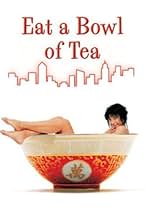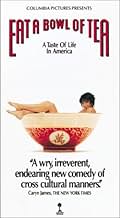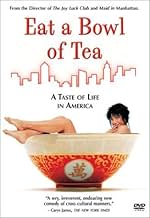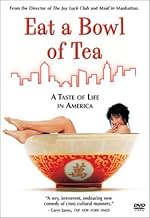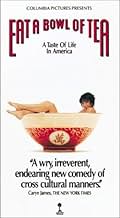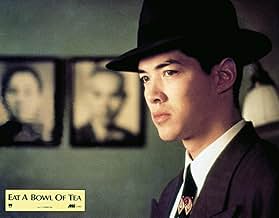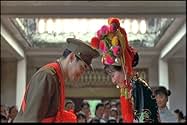A study in culture bridging, including ... a new US-born husband, trying to work within the traditional ways, a new China-born wife, eager to join the "dream" of America, two family-minded f... Read allA study in culture bridging, including ... a new US-born husband, trying to work within the traditional ways, a new China-born wife, eager to join the "dream" of America, two family-minded fathers, lots of gender-related social bifurcations.A study in culture bridging, including ... a new US-born husband, trying to work within the traditional ways, a new China-born wife, eager to join the "dream" of America, two family-minded fathers, lots of gender-related social bifurcations.
Sau-Kei Lee
- Bok Fat
- (as Lee Sau Kee)
Siu-Ming Lau
- Lee Gong
- (as Lau Siu Ming)
Fan Hui
- Ben Loy's Mom
- (as Hui Fun)
Helena Law
- Aunt Gim
- (as Law Lan)
Yuen-Yee Ng
- Third Sister
- (as Ng Yurn Yee)
Ta Lei
- Movie Translator
- (as Lui Tat)
Eric Tsang
- Ah Song
- (as Eric Tsang Chi Wai)
Wai Wong
- Chuck Ting
- (as Wong Wai)
Yu-Yung Teng
- Fat Man
- (as Tang Shun Nin)
Michael Ming-Yang Lee
- Old Lum
- (as Michael Lee)
Wing-Tat Woo
- Sum Woo
- (as Woo Wang Tat)
- Director
- Writers
- All cast & crew
- Production, box office & more at IMDbPro
Featured reviews
A few years after WWII, a young Asian-American man who served his country is sent off to China by his father in the hopes of bringing back a bride. His mother and extended family are still over there, having been separated for decades because of the Chinese Exclusion Act. He's introduced to a young woman, they marry, and then return to America.
The films strengths are in its representation. We see Asian-Americans as real people here, with different personalities, multi-lingual, and having the same problems anyone else has. They have a tightknit community, but are patriotic and assimilated, particularly the younger generation. The stress on the young couple is both cultural (the pressure to produce kids, the lack of privacy) as well as universal (work stress leading to problems in the bedroom, spending too much time in front of the TV, and infidelity). The story went to places I really did not expect it to go, touching on comedy, romance, and drama, and I liked that. I also liked the visibility on the Exclusion Act, which serves as a backdrop to the story, and other little elements, including the reference to Japanese internment when the Korean War starts brewing (fearing it may happen to them), as well as the guy being bruised up after being in police custody.
Undermining all this is the film's acting, which let's just say didn't deserve any awards, as cute as the lead couple are (Cora Miao and Russell Wong). There are a few good moments from one of the old fathers (Victor Wong), but mostly it seemed staged and with poor performances, giving the film a rather lightweight feel. The film tips its hat to both Lost Horizon (1937) and The Lady From Shanghai (1947) which was a lovely touch, but just doesn't conjure up the depth of emotion of the scenes from those films. It kept me engaged from beginning to end though, and director Wayne Wang moved things along nicely. I'm glad I saw it, and think it's worth checking out.
The films strengths are in its representation. We see Asian-Americans as real people here, with different personalities, multi-lingual, and having the same problems anyone else has. They have a tightknit community, but are patriotic and assimilated, particularly the younger generation. The stress on the young couple is both cultural (the pressure to produce kids, the lack of privacy) as well as universal (work stress leading to problems in the bedroom, spending too much time in front of the TV, and infidelity). The story went to places I really did not expect it to go, touching on comedy, romance, and drama, and I liked that. I also liked the visibility on the Exclusion Act, which serves as a backdrop to the story, and other little elements, including the reference to Japanese internment when the Korean War starts brewing (fearing it may happen to them), as well as the guy being bruised up after being in police custody.
Undermining all this is the film's acting, which let's just say didn't deserve any awards, as cute as the lead couple are (Cora Miao and Russell Wong). There are a few good moments from one of the old fathers (Victor Wong), but mostly it seemed staged and with poor performances, giving the film a rather lightweight feel. The film tips its hat to both Lost Horizon (1937) and The Lady From Shanghai (1947) which was a lovely touch, but just doesn't conjure up the depth of emotion of the scenes from those films. It kept me engaged from beginning to end though, and director Wayne Wang moved things along nicely. I'm glad I saw it, and think it's worth checking out.
in the times that every time you see new york now; woody Allen, Pollokaville, there are always scenes of the trade towers that are no longer with us, but although this film is situated in New Yoik, there are no scenes of the outside world. Why is this. and why do the Chinese suffer such great difficulties in New York. A film by wayne wang based on a book which was thought to be forgotten until the chinese literature came into a period of renaissance in the 1970s, Wayne wang named after the actor John Wayne, ironically this wasn't even his real name, it was something like marilyn, so either or, Wayne Wang was always going to be called after an American icon, much to his parents desire. The film juxtaposes culture; chinese onto the new setting; New York. it does this with a relationship at the centre and the chinese culture surrounding this relationship. For the chinese in this film; mostly men, as they have moved to New york to send back money to china, a woman is seen as a much needed asset, an asset that enables the continuing of their culture and their family in their new found land. the woman, has this pressure put upon her and so does the man, ben loi, the man impotent, and the woman cuckolds him to make the rest of the family happy, This film is a great insight into the Chinese and the idea of an alien in a foreign country, both with ben loi going back to china to marry and his wife to be coming over to America, Was it sting wha sang WOOOaaah I'm an alien, I'm a little alien, i'm an englishman in New York.
I recommend also Do the Right thing by Spike Lee
I recommend also Do the Right thing by Spike Lee
We selected this film on the merits of the many famous HK actors involved, so I didn't notice its labeling as a 'comedy' until we got it home. True, it has comedic moments, but so does the Bourne Identity.
The review here also lists the film as Mandarin with English subtitles; it is in Cantonese, with some characters speaking a regional dialect.
The story centers around that period in US history just after WWII where, for the first time, Chinese immigrants were allowed to apply for full citizenship and allowed to bring wives from China; the story follows a young ex-serviceman whose father sends him home to bring back one of the first of these wives. In a few days he's thrust from the club-hopping carefree vet to take his full traditional role as First-Son with all it's trappings and responsibilities, all this on top of he and his wife being one of the first of their kind, a true Chinese-American family.
Put yourself there, you'll agree, this is a lot to heap on a pair of 20-somethings, it wears them down, things fall apart.
It is, in a sense, the same old story, as they say, boy meets girl, boy loses girl, boy finds girl, love always wins, love never loses, put your money on love sort of story, well shot, well put together. It's about an important time in our history while also an important time in all our lives, nothing to shower with awards, but a good story well told and well worth the rental.
The review here also lists the film as Mandarin with English subtitles; it is in Cantonese, with some characters speaking a regional dialect.
The story centers around that period in US history just after WWII where, for the first time, Chinese immigrants were allowed to apply for full citizenship and allowed to bring wives from China; the story follows a young ex-serviceman whose father sends him home to bring back one of the first of these wives. In a few days he's thrust from the club-hopping carefree vet to take his full traditional role as First-Son with all it's trappings and responsibilities, all this on top of he and his wife being one of the first of their kind, a true Chinese-American family.
Put yourself there, you'll agree, this is a lot to heap on a pair of 20-somethings, it wears them down, things fall apart.
It is, in a sense, the same old story, as they say, boy meets girl, boy loses girl, boy finds girl, love always wins, love never loses, put your money on love sort of story, well shot, well put together. It's about an important time in our history while also an important time in all our lives, nothing to shower with awards, but a good story well told and well worth the rental.
A rarity in that we have an American made Chinese film that isn't based on Triad violence.
A breath of fresh air it is.
Young man and woman romance each other in America. Said couple is Chinese. They wish to stick to the traditions but adapt to their new homeland.
A romantic film that you can bring the wife or girlfriend to. And anyone into China or Asia will like it too. The culture gets a good going over here. In a positive way mind you.
And there is a lot of truth to it all too. Yes, elder Chinese men came to the U.S. alone and sometimes never saw their wives for 20-30 years. These marriages lasted. Impressive.
Romance with steamed dumplings here. Nicely done Wayne.
A breath of fresh air it is.
Young man and woman romance each other in America. Said couple is Chinese. They wish to stick to the traditions but adapt to their new homeland.
A romantic film that you can bring the wife or girlfriend to. And anyone into China or Asia will like it too. The culture gets a good going over here. In a positive way mind you.
And there is a lot of truth to it all too. Yes, elder Chinese men came to the U.S. alone and sometimes never saw their wives for 20-30 years. These marriages lasted. Impressive.
Romance with steamed dumplings here. Nicely done Wayne.
Focusing on a little-known aspect of Chinese-American history – that Chinese men who had travelled to the States to make their fortune were prevented by federal law from marrying a native girl and from bringing their sweethearts over from China – director Wayne Wang crafts a pleasant story without really exploring the theme's full potential.
Asian heartthrob Russell Wong plays Ben Loy, a Chinese-American former serviceman in post-WW2 New York, who is allowed to marry a girl from the homeland following a relaxation of the laws due to the assistance given to America by China during the conflict. Fixed up by his wily old father (Victor Wong) with the daughter of a friend, Ben travels back to China and instantly (and fortuitously) falls in love with Mei Oi (Cora Miao, Wayne Wang's wife). Bringing her back to America, however, triggers a series of events that threatens both their marriage, and their entire family's standing in the Chinese-American community.
This is one of those films that, in the first act, looks as if it is going to turn out to be something special. But, sadly, things begin to unravel shortly after the young couple return to the States, and what could have been an insightful exploration into a culture and way of life that is alien to most of us becomes little more than a light rom-com. Ben, under pressure from both a new job that is more challenging than he expected and from a tight-knit community keen to welcome the arrival of the first child born to native parents, finds himself unable to perform in the bedroom. Mei Oi's eventual response to this is as unbelievable as it is cruel, and shoehorns a melodramatic plot that really has no place in a film that seemed to be setting itself up as a gently observed character piece. To add insult to injury, the manner in which it is resolved is equally unrealistic; so many questions are left unanswered, and the conclusion is so badly rushed that it devalues much of the good work that has gone before.
There is no doubt that Wang is an extremely talented director; he composes some wonderfully evocative frames and has a keen eye when it comes to the use of colour and shadow, but his control of narrative structure – in this film at least – is poor, leaving a talented cast to flounder in the second act, and seemingly lose interest midway through the third. Of course, Wang can only do what he can with the story handed to him, and writer Judith Rascoe must shoulder her share of the blame: by asking us to care for a couple about whom we are told so little – both as a couple and as individuals – and who seem to have little direction outside of complying with the wishes of their parent's, she leaves herself open to charges of naivety at best and, at worst, literary laziness.
Asian heartthrob Russell Wong plays Ben Loy, a Chinese-American former serviceman in post-WW2 New York, who is allowed to marry a girl from the homeland following a relaxation of the laws due to the assistance given to America by China during the conflict. Fixed up by his wily old father (Victor Wong) with the daughter of a friend, Ben travels back to China and instantly (and fortuitously) falls in love with Mei Oi (Cora Miao, Wayne Wang's wife). Bringing her back to America, however, triggers a series of events that threatens both their marriage, and their entire family's standing in the Chinese-American community.
This is one of those films that, in the first act, looks as if it is going to turn out to be something special. But, sadly, things begin to unravel shortly after the young couple return to the States, and what could have been an insightful exploration into a culture and way of life that is alien to most of us becomes little more than a light rom-com. Ben, under pressure from both a new job that is more challenging than he expected and from a tight-knit community keen to welcome the arrival of the first child born to native parents, finds himself unable to perform in the bedroom. Mei Oi's eventual response to this is as unbelievable as it is cruel, and shoehorns a melodramatic plot that really has no place in a film that seemed to be setting itself up as a gently observed character piece. To add insult to injury, the manner in which it is resolved is equally unrealistic; so many questions are left unanswered, and the conclusion is so badly rushed that it devalues much of the good work that has gone before.
There is no doubt that Wang is an extremely talented director; he composes some wonderfully evocative frames and has a keen eye when it comes to the use of colour and shadow, but his control of narrative structure – in this film at least – is poor, leaving a talented cast to flounder in the second act, and seemingly lose interest midway through the third. Of course, Wang can only do what he can with the story handed to him, and writer Judith Rascoe must shoulder her share of the blame: by asking us to care for a couple about whom we are told so little – both as a couple and as individuals – and who seem to have little direction outside of complying with the wishes of their parent's, she leaves herself open to charges of naivety at best and, at worst, literary laziness.
Did you know
- TriviaThe movie's ''Eat a Bowl of Tea'' title is a literal English translation to a Cantonese Chinese phrase that means "take your medicine" or "swallow your medicine".
- ConnectionsFeatured in The Slanted Screen (2006)
- How long is Eat a Bowl of Tea?Powered by Alexa
Details
- Release date
- Country of origin
- Languages
- Also known as
- Eine Tasse Tee für die Liebe
- Filming locations
- Production company
- See more company credits at IMDbPro
Box office
- Gross US & Canada
- $231,423
Contribute to this page
Suggest an edit or add missing content



